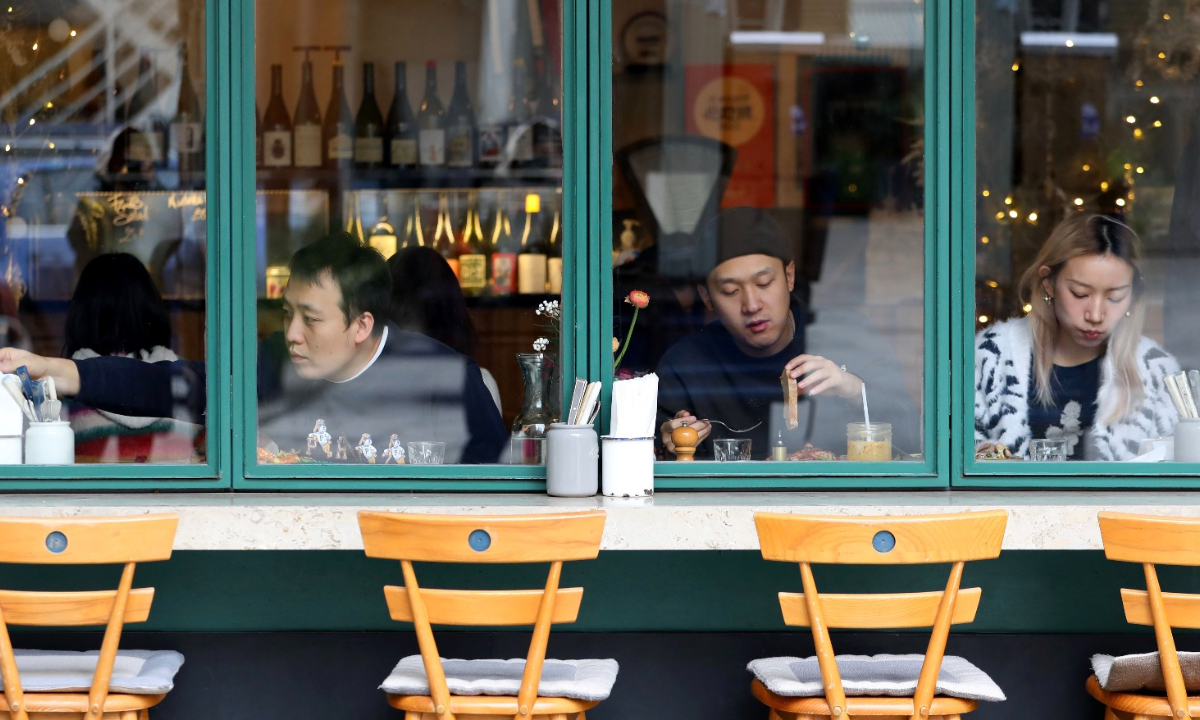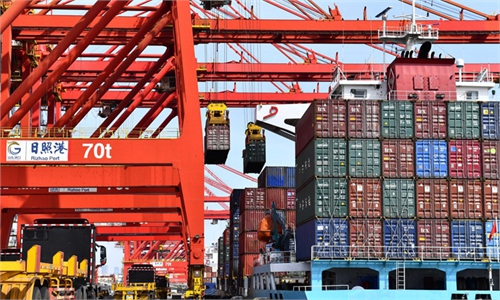China’s retail sales soften 0.2% in 2022, with domestic consumption expected to rebound throughout 2023

Customers have lunch in a restaurant in Shanghai on December 29, 2022 as the city's hustle and bustle gradually returns ahead of the upcoming New Year holidays. Photo: Chen Xia/GT
China's retail sales, a major driver of economic growth, fell 0.2 percent in 2022 due to the impact of COVID-19, but domestic consumption is expected to rebound this year with improving growth prospects and rising incomes.
Fourth-quarter GDP growth was better than expected, indicating the strong resilience of the world's second-largest economy despite internal and external uncertainties. Retail sales are expected to grow 6 percent in the first three months this year, boosted by strong consumption confidence following new optimized antivirus policies, experts noted.
In 2022, retail sales softened to 43.97 trillion yuan ($6.5 trillion) mainly due to sporadic COVID-19 outbreaks, with consumption contributing 32.8 percent of GDP growth, lower than 65.4 percent in 2021, the National Bureau of Statistics (NBS) said on Tuesday.
Sales of consumer goods rose 0.5 percent in 2022, while revenue in catering services decreased by 6.3 percent, according to the NBS.
The consumer market was hit by the epidemic last year, especially for contact-based consumption. In addition, people's willingness to spend declined, complicating the situation, Kang Yi, head of the NBS, told a press conference in Beijing on Tuesday.
The pandemic battered services sector, the most important area of personal consumption, so the contribution of consumption to the overall economy dropped, Tian Yun, a veteran economist and former vice director of the Beijing Economic Operation Association, told the Global Times on Tuesday.
"It means that in 2023, there is huge room for consumption to rebound and contribute to economic growth," Tian added.
Policies to promote consumption were rolled out, stabilizing the consumer market, and some changes emerged. For instance, retail sales in December improved from November, Kang noted.
Retail sales fell 1.8 percent in December, compared with 5.9 percent in November.
In 2022, online retail sales reached 12 trillion yuan. China is still the second-largest consumer market globally and the largest online retail market, Kang noted.
"There will be an obvious recovery of consumption growth in January and February this year, especially during the Spring Festival holidays, probably rebounding to about 5 percent growth year-on-year," Tian predicted.
"In 2023, we are confident in China's consumer market growth. As epidemic prevention and control enters a new phase, the consumer market is expected to recover gradually with normal production and living order restored, and on-site consumption accelerating," the official said.
To further shore up consumption, local governments must do more to stimulate spending, including issuing consumption vouchers, Tian said.
Last year, inflation-adjusted per capita disposable income reached 36,883 yuan, up 2.9 percent, the NBS said.
Employment is another top priority for policymakers in 2023. In 2022, the number of newly employed workers in urban areas totaled 12.06 million, above the earlier goal of 11 million.
In December, the national urban surveyed unemployment rate stood at 5.5 percent, the bureau said.
"The employment achievement is the result of the joint efforts of the central and local governments, especially the job-priority policy that provided fiscal and financial support," Li Changan, a professor at the Academy of China Open Economy Studies of the International Business and Economics, told the Global Times on Tuesday.
Kang said that pressure on the 2023 labor market remains significant with more than 11 million college graduates entering the labor force. But with the improvement of the economy, employment demand will grow this year.
In order to stabilize employment in 2023, China first needs to stabilize growth and provide more support for market participants so they can hire more people, Li added.
Kang said that stable employment and increased incomes will help boost spending this year. The economy will definitely improve overall, leading to an improved employment situation and increasing incomes, which will drive up purchasing power.

